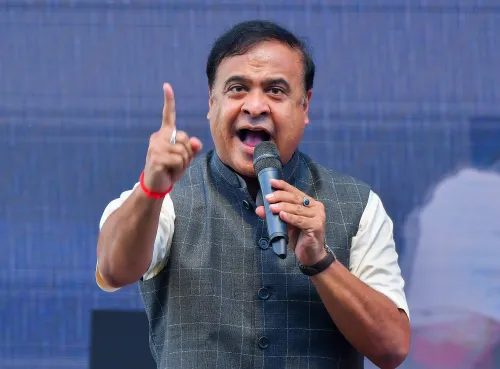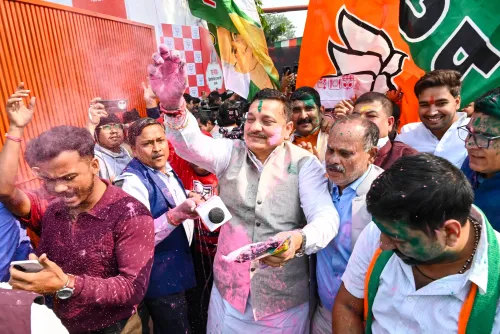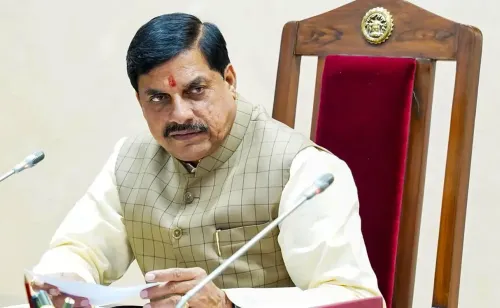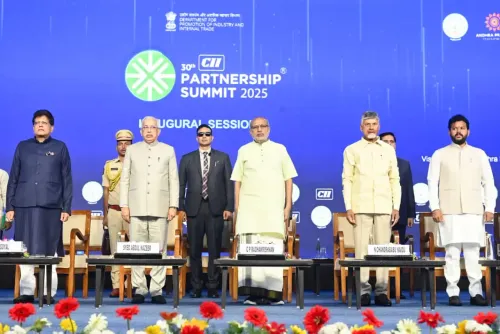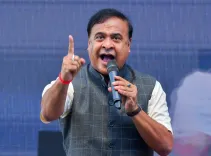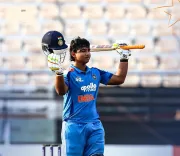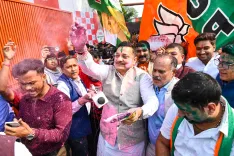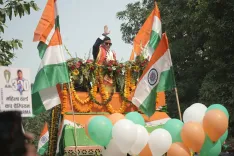Is Tej Pratap Ready to Break Away from His Parents' Political Shadow?
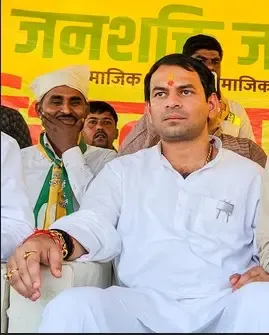
Synopsis
Key Takeaways
- Tej Pratap Yadav's struggle to detach from dynastic politics.
- His attempts to establish a new political identity.
- Past electoral successes contrasted with current polling challenges.
- The importance of public trust in his political journey.
- Implications for Bihar's political landscape.
New Delhi, Nov 14 (NationPress) Despite the continuous decline in polling trends affecting his party, the Rashtriya Janata Dal (RJD), Tej Pratap Yadav is seemingly on the verge of defeat in the Mahua Assembly constituency. This outcome indicates that he has yet to escape the confines of dynastic politics and earn the trust of the populace, which contradicts his previous assertions.
After being expelled from the RJD and attempting to distance himself from his father Lalu Prasad's legacy, Tej Pratap sought to carve out an independent political path through his Janshakti Janta Dal (JJD). Last month, he openly mocked his younger brother Tejashwi, labeling him a child still under their father’s influence, while he claimed to have secured the public's faith. In his quest to establish himself as a standalone, influential leader amid Bihar's already saturated political landscape, he decided to contest from the Mahua Assembly constituency.
In the state elections of 2015, running as an RJD candidate from Mahua, he won decisively against the nearest rival from the Hindustani Awam Morcha (Secular), Ravindra Ray, by over 28,000 votes. In 2020, he again filed his nomination, this time from Hasanpur for the RJD, achieving victory with a margin of around 21,000 votes against the Janata Dal (United) candidate. As of this writing, he is trailing by nearly 44,000 votes behind Sanjay Kumar Singh of the Lok Janshakti Party (Ram Vilas), who currently leads, alongside trailing RJD’s Mukesh Kumar Raushan by over 6,000 votes.
Having vowed never to return to the RJD until the end of his life, the scion of the Lalu dynasty must seriously evaluate his political journey if he fails to assume a leading role in Mahua by the conclusion of counting.
As the offspring of Chief Minister parents, Tej Pratap bears both an inheritance and considerable expectations. Transforming that inheritance into a lasting political campaign will hinge on his capacity to secure the mandate based on merit and transcend mere sensationalism. He is often in the spotlight, known for his bold demeanor and high-profile public engagements.
At 37, he has held the position of state minister overseeing various portfolios, including Health, Environment and Forests, and Backward Class Welfare in successive coalition governments. His ministerial roles reflect both his swift political rise and the enduring impact of his family’s political legacy in Bihar.
However, his personal life, marked by a highly publicized marital dispute, has occasionally overshadowed his policy initiatives, cementing his reputation as a contentious figure rather than a traditional technocratic politician. More than his political accomplishments, he garners media attention for statements and actions deemed entertaining and, at times, controversial.
The looming question remains: Can he pivot to establish and solidify a reliable voter base independent of his family’s core supporters while building his new party to confront his adversaries in the future? The answer remains uncertain, yet it promises to be a challenging and solitary journey if he chooses to navigate the political landscape alone.

